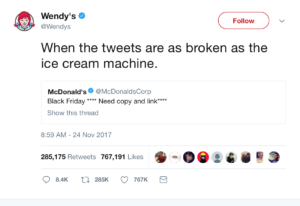We’ve Got Beef: Wendy’s Snarky Twitter
Published on February 21, 2018, at 3:53 p.m.
by Alyssa Comins.

Wendy’s Twitter account has received rave reviews from most social media users and analysts. The brand roasts its competitors and followers, and people find it hilarious. In fact, when you search “Wendy’s Twitter” on Google, there is only one negative article in the first 15 pages.
Honestly, as a public relations student, it’s perplexing to me. This social media savagery goes against everything I’ve been taught about good digital strategy. It seems gimmicky, and I doubt this is a favorable long-term approach.
For now, the snark is garnering plenty of retweets and media attention. But I’d encourage Wendy’s social media team to consider toning down the snide comments and find another way to stand out online. Here’s why:
1. Studies show customers like friendly, helpful brands.
A 2017 Sprout Social survey generated some interesting insights that indicate Wendy’s current Twitter strategy may not be the best method. According to the study, while three in four consumers appreciate humor from the brands they follow, 88 percent are annoyed when companies mock their followers online. Another 67 percent of social media users find companies that heckle competitors annoying.

In fact, the top three traits consumers want from a brand’s social media accounts are honesty (86 percent), friendliness (83 percent) and helpfulness (78 percent). In comparison, only 33 percent of consumers want brands to be snarky online. These findings should concern Wendy’s social media team. Snark and sass can be fun for awhile, but it seems followers will eventually get sick of the negativity.
2. Measuring social media success is easy, but gauging failure is not.
Social media wins are often assessed by retweets, likes and comments. While engagement can be a great way to evaluate success, it doesn’t tell the whole story. It’s easy for social media teams to assume audiences find their snide tweets funny based on a small increase in engagement. However, the majority of a brand’s followers never interact with its posts online, making their opinions hard to decipher.
Measuring the impact of social media on a company’s bottom line has always been tricky, and that’s why brands need to be careful when using risky online strategies. It would be nearly impossible to link a decrease in sales to a brand’s social media use, but that doesn’t mean snarky tweets aren’t causing the decline. Social media failures are hard to discern, so perhaps Wendy’s cheeky online personality is doing more harm than good.
3. One joke too far could cause serious reputational damage.
Brands make mistakes on social media all the time, and it feels like Wendy’s is playing with fire. Savage tweets are fun until they’re taken too far, and then, quite suddenly, no one thinks the brand is cute or clever anymore.
In the age of social media, blunders spread faster than brilliance, and one gaffe can destroy a brand’s reputation for a long time. Wendy’s social team has quite the affinity for brazen comebacks. If it isn’t careful, that approach could land Wendy’s in the middle of a controversy.
4. The social media persona doesn’t align with the Wendy’s brand.
My biggest beef (pun intended) with Wendy’s Twitter account is the utter lack of disregard for brand cohesiveness. Wendy’s social media team has crafted an edgy personality, but no other aspect of the brand feels that way. In 2017, Wendy’s began repositioning its brand in an attempt to make the company more modern. This rebrand includes designing a new restaurant layout with flat-screen TVs, fireplaces and lounge seating to make locations sleek and contemporary.

This change indicates company leadership is trying to attract a more affluent adult demographic. However, the contemptuous social media strategy targets teenagers and young adults. A cohesive brand is incredibly important for business success, but nothing about Wendy’s current strategy feels unified.
Perhaps this bold social media approach will continue to benefit Wendy’s, but I’d caution other social media teams who are thinking about adopting a snarky online personality for the brand they represent. The risks are immense and the benefits are likely short-lived.




